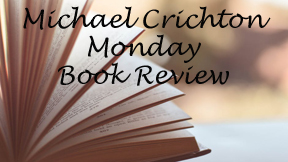Michael Crichton never wrote an autobiography, so the closest we get is “Travels” (1988), a collection of journal entries about first his medical school years and then his visits all over the globe. He drops insights into what inspired his novels and films, and there’s one great chapter about working with Sean Connery on the train sequence in “The Great Train Robbery.”
A shocking revelation
But “Travels” includes a revelation that blows away all the novel and film insights. I was shocked to find out Crichton believes in psychic phenomena. Many chapters are about his observations of psychics and other paranormal purveyors, plus his personal experiences, such as talking with a cactus at a retreat. (That sounds flippant, but the chapter is funny and fascinating.)
Reading his novels, there’s no way to guess at this part of Crichton’s life. The closest hints are “The Terminal Man,” which acknowledges that we know very little about the brain, and “Sphere,” which imagines mental powers unleashed with assistance from an alien force.

Crichton has convinced me that future acceptance of these things into the realm of science will eventually happen. (Throw in the fact that Philip K. Dick, whose futurism is always on-point, wrote about telekinetics all the time, and I’m totally on board.)
Crichton makes a sharp parallel: The fossil record was known prior to Darwin, but Darwin theorized a mechanism for evolution. At that point, the theory of evolution became widely accepted.
Psychic phenomena – despite lots of raw evidence — currently lacks popular theorized mechanisms. As such, the field is not studied much by scientists, and it’s often dismissed out of hand, thus slowing progress.
Life-changers
Although he never wrote a novel blatantly about psychic phenomena, Crichton’s interest in the subject did lead him to notice how the scientific community can be prone to bias and corruptibility, the same as any other endeavor.
That became the theme of “State of Fear,” controversial because it focuses on the politically charged topic of global warming.
His visit to New Guinea also inspired a section of “State of Fear.” It’s less dramatic here in that no one gets eaten by cannibals, yet perhaps more dramatic for revealing a way of life not known in the civilized world: perpetual tribal warfare.
In “Travels,” Crichton doesn’t encounter a life-or-death drama in every entry, but he experiences a lot of things that change him.
His trek to the summit of Mount Kilimanjaro – which can be scaled by walking up its slope — is harrowing because it’s so exhausting. His description of walking through volcanic scree – two steps forward, one slide back – is enough to tire a reader relaxing on his couch.

Recognizable anecdotes
Fans of “ER” will enjoy reading about the specific anecdotes recycled for scenes in the pilot episode, “24 Hours.” (See my review of that episode for its connections to “Travels.”)
But the most insightful chapter that we can immediately apply to our everyday lives is “They.” “Disclosure” cribs from it, notably the conversation with a friend where Crichton (and the novel’s leading man) admits he’d love it if a woman sent him flowers.
Crichton theorizes that the stereotype of men as logical and women as romantic – which he has seen flipped too many times to be dismissed – comes from each gender reflecting themselves on the other.
Then, throw in the fact that many individuals don’t fit stereotypes (even if the stereotype was reversed and “corrected”), and he concludes it’s best to start from a base assumption that men and women are the same.
Not a biography, but close
Crichton tells us upfront that “Travels” isn’t a biography, so we have to be content with tantalizing tidbits. His relationship with his father was rough, but after his dad died, he resolved his issues through an inner psychic experience that surprised him with its power and quickness.
The diving sequences of “Grave Descend” were inspired by jaunts with his sister. Crichton’s mom goes mostly unmentioned, as does his brother Douglas, with whom Crichton wrote “Dealing.” His wives and girlfriends are present only as supporting characters.
You couldn’t devise a family tree or spousal chronology (MC had five wives, tying PKD). But a reader does learn a ton about the experiences and inner life of the author. Heck, in a way this ranks as one of his best character pieces.
A Crichton biography is still needed so we can get outside observers’ perspectives on the man. At least the insider’s perspective already exists via “Travels,” and it’s wonderfully open and forthcoming.

